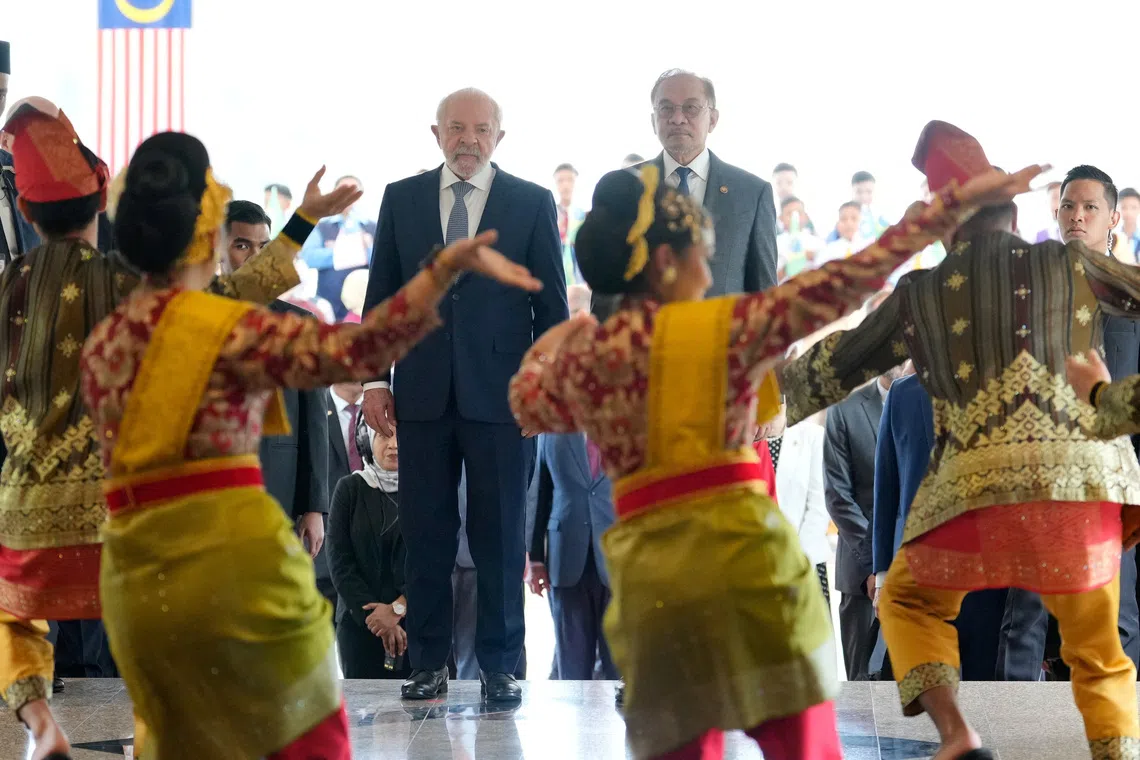Leaders from Trump to PM Wong to meet at Asean Summit, amid talk of trade and peace
Sign up now: Get insights on the biggest stories in Malaysia

Brazilian Luiz Inacio Lula da Silva (left) and Malaysian Prime Minister Anwar Ibrahim being welcomed by traditional dance performers in Putrajaya, Malaysia, on Oct 25.
PHOTO: REUTERS
Follow topic:
- PM Wong attends the 47th Asean Summit in Kuala Lumpur from Oct 26-28 to reaffirm Asean's community-building commitment.
- Discussions will focus on promoting an open, stable regional architecture, enhancing intra-Asean trade, and addressing the digital and green economies.
- Asean will admit Timor-Leste as its 11th member, and upgrade its Asean Trade in Goods Agreement (Atiga).
AI generated
KUALA LUMPUR – World leaders including Singapore Prime Minister Lawrence Wong, United States President Donald Trump and Chinese Premier Li Qiang are meeting at the Asean Summit in Kuala Lumpur this weekend, as issues from the US-China trade war to peace on the Thai-Cambodian border come under the spotlight.
The 47th Asean Summit will also be significant for the expansion of the grouping for the first time since 1999.
Timor-Leste, an island nation with a population of 1.3 million, will be officially admitted into Asean
On the cards too is the expected signing of an agreement between Cambodia and Thailand
Asean will also be upgrading its Asean Trade in Goods Agreement, a key free trade pact for the region first signed in 2009, and the Asean-China Free Trade Area agreement.
PM Wong will be in Kuala Lumpur from Oct 26 to 28 to attend the summit and related meetings. He and other regional leaders will reaffirm their commitment to Asean’s community building efforts and discuss ways to promote an open, inclusive and stable regional architecture.
“They will also discuss strengthening Asean’s economic integration by enhancing intra-Asean trade and tapping into emerging areas in the digital and green economies,” the Prime Minister’s Office said in a statement on Oct 25.
The event, based on the theme of inclusivity and sustainability, will be the second of two summits hosted by Malaysia as the 2025 Asean chair, following the first on May 26 and 27.
The summit comes at a pivotal time for the region. With major powers jostling for influence and the global economy facing continued headwinds, Asean’s ability to maintain unity and relevance will be closely watched.
Peace in the region was disrupted earlier in July 2025, when border clashes between Thailand and Cambodia killed more than 40 people and displaced over 300,000, marking the most serious fighting between Asean member states in recent years.
A truce was brokered on July 28
Since then, talks had been conducted in Kuala Lumpur to finalise a permanent ceasefire and deploy observer teams along the shared border.
An agreement between Cambodia and Thailand is expected to be signed by the leaders of both countries and witnessed by Mr Trump.
Observers say the summit could also set the tone for how Asean engages with Washington during President Trump’s second term, as his administration’s focus on trade protectionism and rare-earth restrictions injects fresh uncertainty into regional markets.
South-east Asia has been especially targeted by Mr Trump’s tariff regime.
The region has attracted rates of mainly 19 per cent to 40 per cent – due to a large trade surplus with the US and for being a conduit of Chinese trade, including via what Washington says is illicit transshipment.
Singapore, which buys more from the US than sells to it, contends with the base rate of 10 per cent.
Against this backdrop, progress on Asean’s own economic frameworks, including the upgraded trade pacts and plans for an Asean Power Grid
The region’s leaders are also expected to seek a stronger collective response to issues such as supply chain resilience, energy security and cross-border cyber threats, while managing the delicate balance between the US and China.
Besides Mr Trump, other leaders including Japan’s new Prime Minister Sanae Takaichi, Brazilian President Luiz Inacio Lula da Silva and South African President Cyril Ramaphosa are also slated to attend the meetings.
“This represents a new strategic direction for Malaysia and Asean in expanding diplomatic and trade ties with other regions, including Africa and Latin America,” said Malaysian Prime Minister Anwar Ibrahim, the summit’s host, on Oct 22.
While Mr Trump’s attendance is seen as a win for the grouping, some high-profile leaders have opted out of attending in person, including Russian President Vladimir Putin and Indian Prime Minister Narendra Modi
Not everyone welcomes Mr Trump’s visit.
Malaysian civil society and political groups opposing Mr Trump’s visit are planning to hold protests. A rally titled “Trump You’re Not Welcome in Malaysia” is scheduled for Oct 26 at Ampang Park, near the Kuala Lumpur Convention Centre where the meetings will be held.
For Malaysia, which will be handing over its Asean chairmanship to the Philippines, the summit is a chance to highlight its role as a mediator in regional disputes and a proponent of sustainable, inclusive growth – themes expected to feature in discussions.
The Asean leaders will be attending two large-group meetings: the 28th Asean Plus Three Summit with their counterparts from China, Japan and South Korea; and the 20th East Asia Summit, which includes Australia, China, India, Japan, South Korea, New Zealand, Russia and the US.
PM Wong, who is also Finance Minister, will be accompanied on the trip by his wife, Mrs Wong, and Foreign Minister Vivian Balakrishnan.
PM Wong is expected to meet leaders from key partners including Australia, China, India, Japan, New Zealand, South Korea and the US.
In his absence, Deputy Prime Minister and Minister for Trade and Industry Gan Kim Yong will be the Acting Prime Minister.


